Quantum computing: An outlook – How do experts assess the development?
Quantum computing: An outlook - How do experts assess the development?
 Hardly any other technology is currently raising such great expectations as quantum computing (QC). With the possibilities offered by quantum physics and the resulting enormous computing power, quantum computers can accelerate the development of medicines and vaccines, revolutionize materials research and optimize logistics chains, for example.
Hardly any other technology is currently raising such great expectations as quantum computing (QC). With the possibilities offered by quantum physics and the resulting enormous computing power, quantum computers can accelerate the development of medicines and vaccines, revolutionize materials research and optimize logistics chains, for example.
Over the last few decades, quantum computing has established itself as a new field of research. Since the mid-1990s, great progress has been made in the development of quantum hardware. The landscape of available quantum or quantum-inspired computers is rapidly evolving into a diverse collection of systems with different strengths and weaknesses. The potential of this technology is undoubtedly great, which is why more and more companies are trying to be among the innovators in this field. The aim is to make the so-called quantum advantage economically viable for their own company in order to gain a competitive advantage over the competition. This is a decisive success factor, particularly in view of saturated markets in many sectors and an oversupply of new competitors entering the market. New, forward-looking and innovative technologies are intended to leave the competition behind. Quantum technologies offer a promising springboard here. For this reason, many large companies now employ their own quantum experts or entire departments to work on this area.
But how justified is this enthusiasm and what advantages can quantum technology offer companies in the future? What can companies and educational institutions actively do to train the experts needed to be prepared for quantum computing? And which skills are relevant at all? In the following article, you can read about the current picture based on a survey of experts.
Expertise in quantum computing
To this purpose, the QAR-Lab Bayern at Ludwig-Maximilians-Universität in Munich, in cooperation with Anaqor AG, interviewed experts working in the field of quantum computing as part of the BMWK-funded PlanQK project.
The goal of the study was to identify the necessary skills, tools and processes in the development of quantum computing solutions in order to create a fundamental understanding of this new technology on the one hand, and on the other to introduce both industry and science to quantum computing in the best possible way.
The survey was conducted between June and October 2022. A group of 105 experts from the field of quantum computing took part in the study. 44.0% of the experts surveyed came from the field of physics and 23.0% from computer science (see Fig. 1). This means that a majority of two thirds of the respondents can be assigned to these two groups. 31.0% of the participants work as researchers in the field of quantum computing, 20.0% come into contact with it as managers and 15.0% are involved as developers (see Fig. 2). 68.6% of the experts state that they are able to assess the areas in which quantum computing can be used and supported (see Fig. 3). Here, it is primarily the group of researchers, managers and developers who recognize use cases that could benefit from quantum computing. 61.9% of the experts say they can identify the potential and possible quantum computing algorithms for use cases. Of these, 23.0% are researchers, 11.0% developers and 10.0% managers. In the area of implementing quantum computing algorithms, 41.9% state that they have knowledge. Here it is mainly researchers (21.0%) and developers (10.0%) who program quantum computing algorithms on NISQ (Noisy Intermediate-Scale Quantum) computers. Only 33.3% state that they are able to evaluate use cases for runtime and quality and estimate the necessary hardware resources that could lead to a quantum advantage. These results show, for example, that regardless of the role held in the company, there is an understanding of which practical problems can be solved using quantum computing and in which areas quantum computing could contribute significant added value in the future. At the same time, it can be seen that quantum computing is still a field of research in which potential is recognized, but it is still necessary to find out how far quantum computers are from practical/ industrial applications. Currently, quantum computers are capable of solving simple and small problems. However, real and relevant problems are not yet solvable on current NISQ hardware due to error probabilities and limited resources.
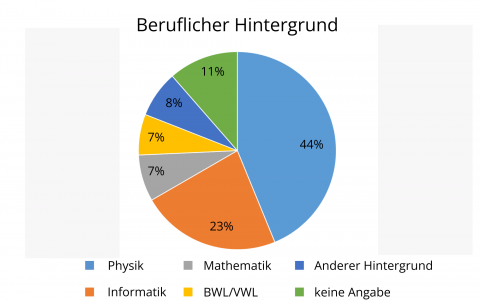
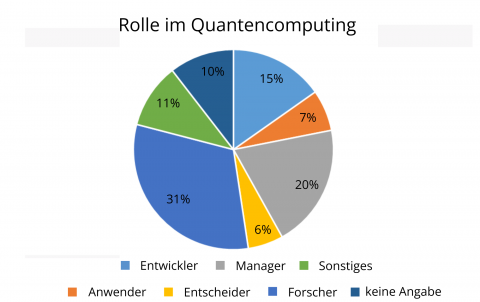
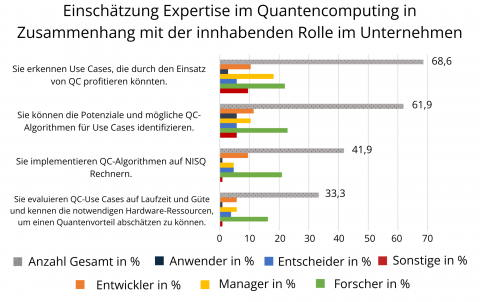
Lack of quantum computing specialists
The skills shortage is currently clearly noticeable across almost all sectors. As a result, it is becoming increasingly difficult for companies to fill their vacancies. Especially in areas that require a high level of specialist knowledge and expertise, it is a challenge to find highly qualified specialists. This also applies to the field of quantum technologies. Quantum computing and quantum research are still young fields of research for companies, and the hype surrounding the topic and related subject areas only became increasingly popular at universities a few years ago. As a result, the number of experts in this field is currently still rather low. But how many experts are there actually across Europe? According to the experts surveyed, over a quarter (25.7%) estimate the number of quantum experts in Europe to be between 101 and 500 (see Fig. 4). In terms of the role held by the respondents, it is mainly researchers and developers who share this view. In contrast, the majority of managers surveyed consider a number between zero and 100 to be realistic. Overall, around half (50.5%) of respondents estimate the number of quantum computing experts in Europe to be less than 1,000. A look at the unfilled vacancies in this area and the growing demand reveals a major shortage of quantum experts. This is also confirmed by the survey participants: over a third (37.1%) of respondents plan to hire one to five new quantum computing specialists within the next three years in order to meet the challenges ahead (see Fig. 5). And as many as 14.3% even plan to hire more than 20 new quantum computing specialists. Only 6.7% do not plan to hire any staff in this area at all within the next three years.
With the increasing maturity of the technology and the realization of commercial applications, the demand for specialists is expected to increase further. It is therefore important to start thinking about training and further education in the field of quantum computing today.
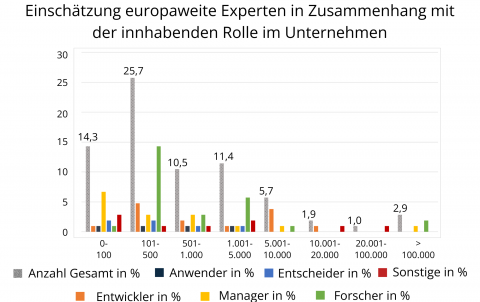
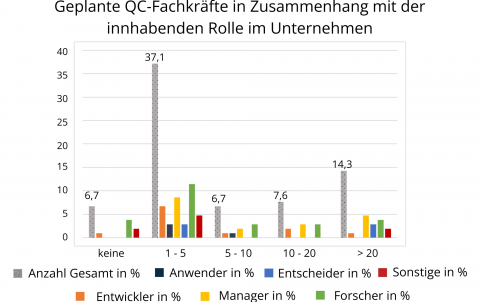
Monetarization models
Quantum computing is still at the basic research stage and it remains to be seen when the technology will be put to beneficial use in industry. Nevertheless, a wide variety of institutions, companies and research facilities are already making intensive use of quantum hardware to perform and test calculations with newly developed quantum computing algorithms. The participants in the study were asked about the monetization model they consider most promising for the implementation of quantum solutions. Of these, 33% believe that a flat rate for code calls in a given period of time is a sensible model (see Fig. 6). 23% of the experts surveyed opted for billing per executed code. It is mainly researchers (9%) and developers (6%) who consider this monetization model to be promising. 18% see the purchase of a contingent of calls as a good model for gaining access to quantum computers. At around 8%, it was primarily managers whose role involves quantum computing who favored this model.
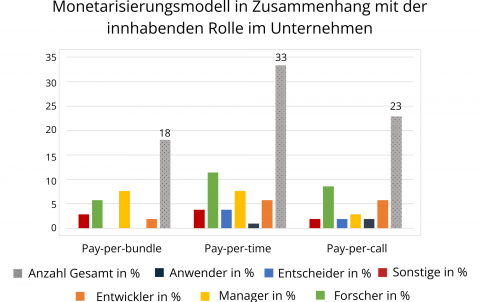
Solution concepts for the processing of QC use cases and their application
With regard to the solution approach, over half (52.4%) of the experts surveyed stated that they focus on the concept when working on QC use cases (see Fig. 8). If the role held in the company is taken into account in this context, the majority of researchers and decision-makers focus on the conception of the solution, whereas the majority of managers surveyed tend to focus on the applications and a slight majority of developers on the services. One explanation for the different preferences of the various professional groups may be that researchers, for example, place more emphasis on the development of the underlying theories. In contrast, managers and developers are interested in the practical implementation of the theories and the benefits behind them.
With regard to the planned use of quantum computing solutions, it can be seen that 36.2% of the experts surveyed develop their solutions for their own company and not as a service provider for external third parties (see Fig. 7).
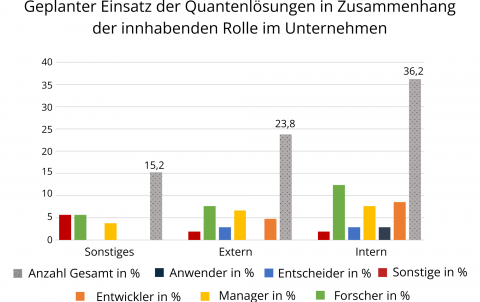
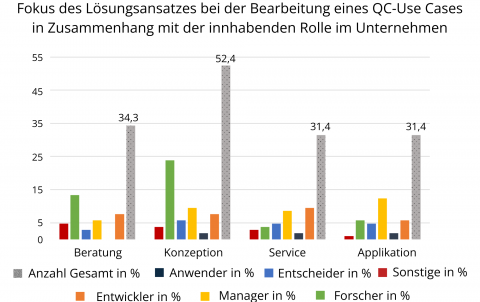
Tools for implementing QC algorithms
Designing and implementing new QC algorithms presents users and developers with enormous challenges. The programming mindset differs significantly from the paradigms and concepts of conventional software and algorithm development. Appropriate tools can support the developer here. With regard to the study, both auxiliary libraries for QC problem formulation and hardware-agnostic software development kits (SDKs) should be emphasized. The former was rated as important to very important by 55.2% and the latter by 47.6% of respondents (see Fig. 9). On the other hand, the NISQ analyzer for identifying suitable QC hardware for a given algorithm (32.4% important to very important) and an automated parameter search (30.5% important to very important) were of less interest. In addition to the tools listed in the study, other tools such as benchmarking libraries and tools for error mitigation were also mentioned.
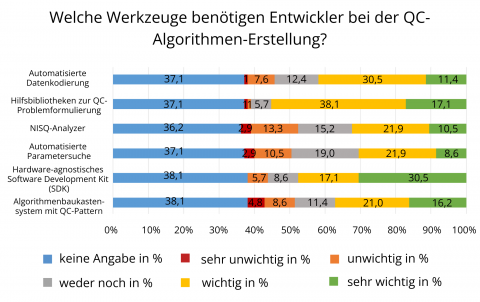
Processing and using implementations
Following the implementation of QC solutions, the focus is on processing and utilization. With regard to the study, 46.6% of participants were in favor of a comprehensive evaluation of the scaling behavior of the implementations (important to very important), while the development of a pricing model, the integration of the implementations into the company’s operational environment or the choice of deployment partners were of secondary importance. In comparison, only 25.7%, 29.5% and 27.7% of respondents respectively voted important to very important (see Fig. 10). This can partly be explained by the fact that quantum computing is still at an early stage and the calculations on quantum hardware are not yet applicable to relevant industrial problem sizes. The number, quality and connectivity of the qubits in current hardware are usually not sufficient to effectively implement particularly extensive or complex tasks. For this reason, the focus is primarily on the design and scaling behavior of the implementation at the current time before price models are developed or deployment in the production environment is tackled.
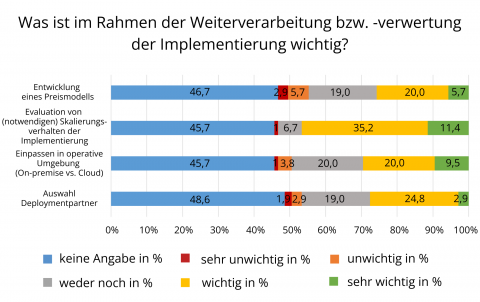
Skills for the implementation of QC algorithms
The programming of QC algorithms requires some more or less necessary basics and skills. In the study, the participants were asked to rate both the essential skills according to their importance (see Fig. 11) and their own expertise in this regard (see Fig. 12). Interestingly, the skills that were predominantly rated as important to very important are reflected in the participants’ own assessment, who are estimated to have a high to very high level of expertise in this area. Particular emphasis was placed on knowledge of optimization procedures (43.8%), understanding of scientific publications (41.9%), basic knowledge (43.8%), and knowledge of the latest research findings (41.9%). publications (41.9%), basic knowledge of linear algebra (40.0%) and quantum physics (38.1%), and especially Python programming skills (42.8%) were particularly emphasized. Correspondingly, own expertise in optimization methods was rated by 25.7%, understanding of scientific publications by 37.1%, basic knowledge of linear algebra and quantum physics by 38.1%, and knowledge of Python programming by 42.8%. publications by 37.1%, basic knowledge of linear algebra and quantum physics by 30.4% and 26.7% and programming knowledge by 31.4% of the participants.
Interestingly, competencies for QC algorithm development in the area of machine learning (ML) and simulation were ranked comparatively lower. Only 21.9% and 25.7% of participants voted for important to very important. The assessment of their own expertise is also relatively low in this regard. Only 19.1% and 21.0% of participants stated that they had great to very great expertise in these areas. This result is unusual in that machine learning and (quantum) simulation are seen as one of the most promising fields of application and research in quantum computing, but both the assessment of the study participants and their stated expertise tend to differ. This can be partly explained by the participants’ respective backgrounds and professional fields. Machine learning and simulation algorithms are themselves comparatively new and highly complex technologies and fields of research and are usually only taught in advanced studies. Consequently, this in turn highlights the need to train future specialists in these fields (ML and simulation) in order to provide a basis for combining them with quantum computing.
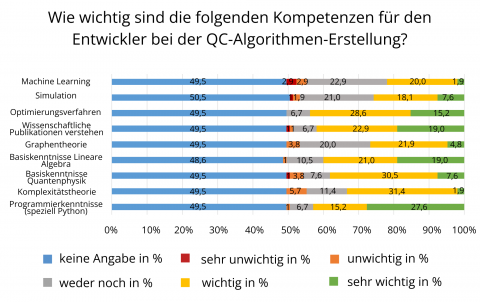
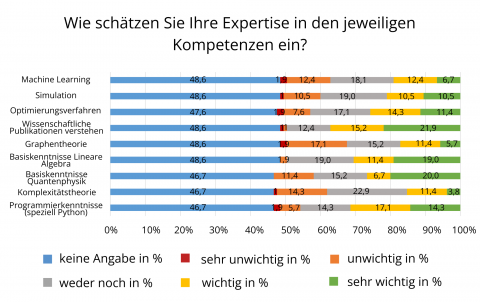
Projects, initiatives and business models to support quantum computing
The measures to promote quantum computing in Germany are discussed below. The participants in the study were primarily in favor of training and further education opportunities (37.2%), alliances such as QUTAC (34.3%), but also access to QC hardware (40.0%) in order to promote QC in Germany. In particular, further training opportunities in the form of learning platforms and programming-related training with various SDKs were also desired. Access to QC applications as a service (23.8%) was considered comparatively less important to very important (see Fig. 13). This is presumably also due to the maturity of QC hardware, which currently offers little added value for companies’ business models and will therefore come into play at a later date. Nevertheless, the early discussion and development of QC solutions in the form of services is essential in order to remain competitive on the software side in the future.
Essentially, the results in Fig. 13 show how important the exchange of knowledge between industry, science and academia is. Funding projects such as PlanQK, which offer an ecosystem, a knowledge platform and low-threshold access to QC hardware, are promoting the topic of quantum computing in Germany and making it easier to get started with this new technology.
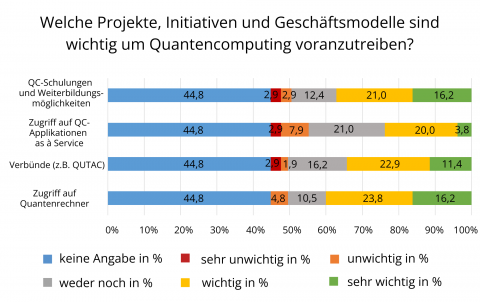
Challenges and difficulties in implementing use cases and algorithms on hardware
The implementation of algorithms and use cases on current QC hardware poses a number of challenges for developers and users. In Fig. 14, various hardware aspects that can impair implementation were ranked in ascending order of influence by the study participants. Looking at the first three rankings per hardware aspect, coherence time, gate accuracy and the number of qubits are particularly noteworthy. Readout errors, hardware topology and communication latency are of secondary importance in the implementation. The results reflect the current level of maturity of the QC hardware, which is still very susceptible to noise, and the associated hurdles in the implementation of relevant QC solutions. Since the corresponding error correction algorithms themselves are very resource-intensive, particularly long coherence times and high gate accuracy are desirable in order to be able to execute relevant and deep quantum circuits on the NISQ hardware and to achieve early added value in algorithm and use case development. Other factors, such as communication latency, which occurs due to the mostly cloud-powered quantum computers, currently play a subordinate role.
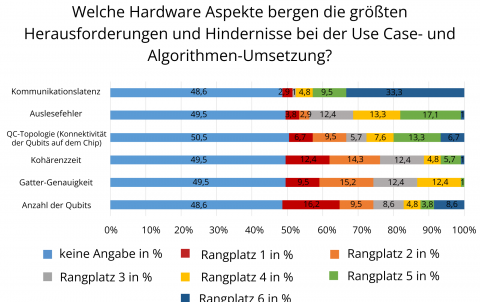
Conclusion
Quantum computing is a rapidly developing technology that uses the characteristics of quantum mechanics to perform complex calculations where classical computers reach their limits. However, current QC hardware is still very limited in hardware resources such as the number of qubits and their connectivity. In order to create added value for the industry right now, the hurdles and challenges of QC must be tackled. In addition to suitable hardware and software, the industry using it also needs competently trained specialists. Appropriate skills and software tools are essential to support users and developers in the implementation of NISQ algorithms. The QC expert study carried out is intended to help identify the basic needs for action and skills in order to jointly prepare and advance both science and industry for the new QC technology.
The experts in the study are primarily in favor of access to QC hardware and mergers and associations, such as QUTAC, in order to promote QC in Germany. However, QC applications as a service, which will become relevant at a later date and at a more advanced stage of hardware maturity, are currently of secondary importance (see Fig. 13). This result is also reflected in the experts’ focus. When developing use cases and algorithms, the majority of respondents are primarily concerned with conceptualization (see Fig. 8) and an extensive evaluation of the scaling behavior of the corresponding algorithms (see Fig. 10) in comparison to productively deployable services and applications. In terms of tools, the majority of respondents are in favor of a hardware-agnostic SCD in order to be able to develop uniform algorithms on the software side in the heterogeneous QC hardware landscape and to avoid the need to acquire different programming languages and SDKs. Help libraries for QC problem formulation are also desirable in order to simplify access for non-specialist personnel (see Fig. 9). Finally, it should be mentioned that the creation of extensive training and further education opportunities for new specialists is essential in order to counteract the shortage of specialists for the new QC technology. This can also be seen in Fig. 4, where the majority of the experts surveyed estimate the number of QC specialists with the relevant expertise to be less than 500 across Europe.
Authors:
Christoph Roch: Research Associate bei Department of Mobile and Distributed Systems at Ludwig-Maximilians-Universität (LMU) Munich
Christoph Roch is doing his PhD at the LMU Munich at the Chair of Mobile and Distributed Systems with a focus on optimization problems and their solvability by quantum computing. Additionally the computer scientist is a member of the Quantum Applications and Research Lab (QAR-Lab) and contributes his knowledge to various industrial projects, research and teaching.
David Niehaus: COO bei Anaqor, PlanQK
David Niehaus is the Co-Founder and COO of Anaqor as well as community manager of the PlanQK research project, which is a flagship initiative for the use of quantum computing in Germany and is supported by the Federal Ministry for Economic Affairs and Climate Action. Having completed a dual Master’s degree program in Berlin and Toulouse, David has gained experience working in various positions within the aviation industry across the US, France, Great Britain, and Germany. Prior to his role at Anaqor, he served as the Complexity Management Lead for Germany at consulting firm umlaut, where he successfully led several projects with clients from diverse industries to set up successful product development processes.
Angelika Debes: Research Associate bei Ludwig-Maximilian-University Munich
Angelika Debes completed her Master’s degree in Human Resource Management and has been working as a research assistant in the QAR Lab at the Chair of Mobile and Distributed Systems at LMU Munich since 2020.

